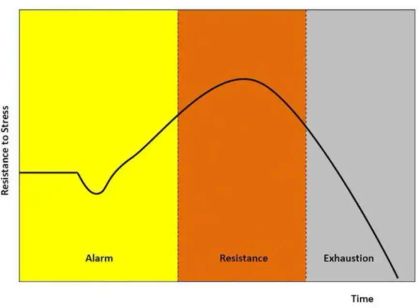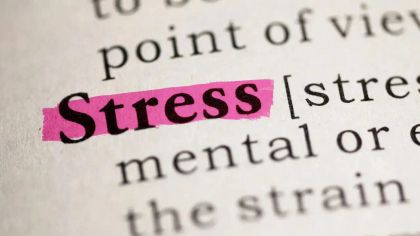90% of entrepreneurs who try to lose weight focus on changing their diet and working out.
And while that's good, they tend to miss a crucial piece of the puzzle:
Stress.
Poor stress management destroys those efforts - you will:
- Store more fat
- Crave junk food
- Get sleepless nights
- Be unmotivated to train
- Lose patience and get irritable
You have to master it because let’s be honest, stress won’t disappear.
In this newsletter, we’ll cover 3 essential pillars to conquer stress.
Let's dive in.
Understanding stress
Stress is widely misunderstood.
Before we unlock the keys of stress management, let’s get clear on its purpose and how it works.
Here are three common myths about stress that you need to ditch:
Myth 1 - “Stress is bad"
Picture yourself in the tundra 20,000 years ago. It’s freezing and you haven't eaten in days. Half of your tribe has already died. You’re desperate to find something edible. Suddenly, you spot a saber-tooth tiger.
You have no time to think and must act immediately to survive: Fight, run, or hide. Luckily, your body has a bodyguard wired into your nervous system. Stress: Its purpose is to give you an energy boost when you face threats.
Our ancestors wouldn’t have survived without it. Here’s the problem: Your body still reacts to perceived threats, even if they aren't actually life-threatening.
- Deadlines
- Filing taxes
- Arguments with your boss
- Being yelled at by your partner
- Getting nasty comments online
None of these will kill you, but your body doesn’t know that. That's why you need to understand how this system works, its triggers, and how to manage the response.
Myth 2 - “Stress is stress”
Let’s take a closer look at the stress response. It has three phases:
- Alarm: You see the saber-tooth tiger
- Resistance: You gain an energy boost to fight
- Exhaustion: You run out of energy (and die)
Stress should be a short-term response.

Image Source: Clean Health Institute
It helps you escape danger but requires recovery afterward. But today, we encounter many persistent challenges:
- Long work hours with little social interaction
- Being overloaded with technology and distractions
- Striving for success and meeting high expectations
This causes chronic stress - the bad stress.
Think about working out to illustrate this: Lifting weights puts stress on your body. If stress was bad, couch potatoes would be healthier than gym-goers.
Here’s the caveat: Your muscles need rest to grow. Chronic stress is like daily workouts without breaks, destroying instead of building you. Similarly, your nervous system needs time to recover after stress.
Myth 3 - “Stress is the same for everyone”
Here are things that used to stress me out:
- Opening the mail
- Calling a restaurant
- Messaging a potential client
- Getting a client message at 10 pm
- Seeing a voice message on WhatsApp
I was less stressed squatting 200 kg. Yes, that’s illogical. 200kg on your shoulders is more dangerous than a 5-minute phone call.
But remember, stress is linked to how you perceive things:
- Fear
- Worries
- Negative expectations
... can cause a stress reaction like actual events.
I used to have terrible social anxiety, which made phone calls harder than 200kg Squats. Joe Dispenza explains in his book that imagining a stressful event can cause the same bodily reaction as actually facing it.
For example, dreading a meeting with your tax consultant can make your body react as if you're already there. This anticipation is what sets top athletes apart, affecting how they handle competition stress:
Successful athletes get excited. Less successful athletes get anxious.
Scientists distinguish between "Eustress" (positive, exciting stress) and "Distress" (negative, anxious stress).
On top of that, genetic factors play a major role too: Some people naturally have higher baselines of adrenaline and dopamine levels - stress hormones. They might be more prone to exhaustion in stressful situations.
3 pillars of stress management
Considering all these factors, it only makes sense that excess stress can manifest in different ways:
- Mentally, this leads to irritability and poor focus
- Physical manifestations like tension and discomfort
- Emotional turmoil causing mood swings and anxiety
This also means that we need to tackle stress on different levels: A 10-minute meditation won’t do the job.
Let’s dive into it.
1 - The 85% rule
“If you tell most A-type athletes to run at their 85% capacity, they will run faster than if you tell them to run at 100%, because it’s more about relaxation, and form, and optimizing the muscles in the right way.” - Hugh Jackman
If you watch world-class athletes like:
- Usain Bolt
- Stephen Curry
- Michael Phelps
... you'll notice how calm they are. They seem unfazed by their competition and in complete flow.
You can approach your business the same way: Avoid the constant "hustle and grind" - mindset. It'll make you tense and anxious. Instead, aim to work at 85% of your capacity. You'll prevent exhaustion and achieve a smooth workflow.
This method gets even more powerful through reframing: Think about stress in a positive way, like successful athletes. I used to worry about phone calls, afraid I'd annoy others or say the wrong thing.
Here are some helpful ways I reframed it:
- It’s an opportunity to connect with great people
- Those calls give me the opportunity to change lives
- I get to learn and practice new skills by making this phone call
Notice how my focus shifted from problem to possibility.
2 - Relaxation
To avoid burnout, relax in different ways: Physically, mentally, and emotionally.
The foundation is quality sleep. Poor sleep quality leads to fatigue and irritability, making even minor work issues stressful. The last thing you need.
On top of that, you also want to add additional measures to support these pillars. Here are some ideas:
Physical:
- Walks
- Breath work
- Infrared Sauna
- Cold exposure
- (Light) Exercise
Mental:
- Journaling
- Mindfulness
- Breath work
- Reading fiction
- Declutter your space
Emotional:
- Time in nature
- True enjoyment
- Quality social time
- Emotional management
- Listen to your favorite music
3 - Essentialism
Get rid of time and energy thieves. Focus on the most important tasks instead of saying "yes" to everything. This prevents you from feeling swamped by endless to-do lists, especially as an entrepreneur.
Here are some pillars of the essentialist philosophy:
- Less but better
- Protect your time
- Say “no” more often
- If it’s not a “hell yes” it’s a “hell no”
- Trade-offs are inevitable - choose them well
If you want to learn more about essentialist philosophy, check out the book “Essentialism” by Greg McKeown.
Summary
In a nutshell, here are five key takeaways about stress:
- Stress is your body's way of protecting you.
- Chronic stress is the bad stress.
- Stress is unique to each person.
- Genetics can influence how you respond to stress.
- People react differently to stress.
Use the 85% rule, relaxation, and Essentialism to manage your stress. This way, you can lose weight and be healthier without losing performance or productivity.
If you’re ready to conquer your stress, so that you can reach your ideal physique easily and boost your confidence, click HERE.
